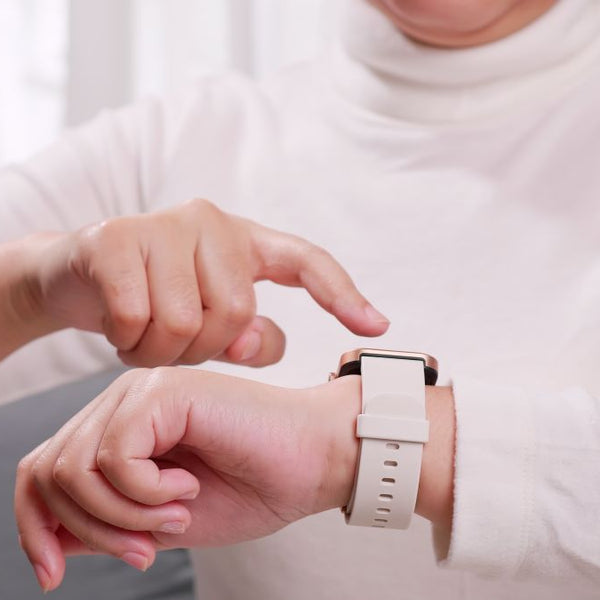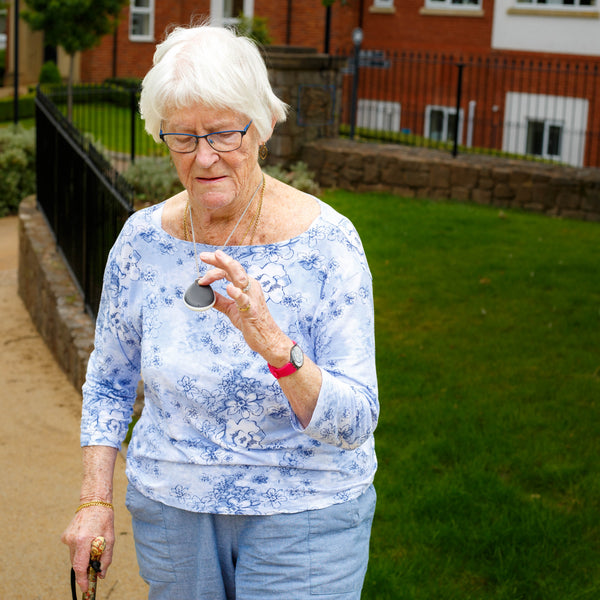Disability alarms are valuable tools for promoting independence and ensuring help is always accessible during an emergency. They are easy to set up and use. The alarms help people with different disabilities call for help quickly in an emergency.
The wearable alarms are monitored 24 hours a day by a special call centre. This centre is sometimes called an alarm monitoring centre or Emergency Resolution team.
When someone presses the emergency button, the team will answer promptly. They will talk to the disabled person through the device to understand the situation. They will arrange help as quickly as possible from neighbours, family or the emergency services. The benefit of a monitored service is that it does not depend on a friend or family member to answer the initial alarm call.
Look for monitoring centres with reputable industry accreditations, such as TSA membership.
Subscription fees differ based on the type of alarm and its features. Many providers offer flexible payment options to fit various budgets.
There are several main types of disability alarms. We look at which features are most suitable for different disabilities and health conditions.
- Physical disabilities
- Sensory disabilities
- Cognitive disabilities
- Mental health and learning disabilities
- Invisible disabilities, chronic illness and complex multiple disabilities
- How a disability alarm supported Denise's independence
Physical disabilities
Physical disabilities fall into two main categories:
Mobility impairments: Difficulties with walking, standing, or moving, often due to conditions like arthritis, osteoporosis, multiple sclerosis, Parkinson's, chronic illness or genetic disorders.
Dexterity impairments: Limitations in motor skills, such as those caused by arthritis, nerve damage or injury that limit hand-eye coordination or the ability to use hands and fingers for precise movements.
A person with mobility impairments may find it hard to reach a phone for help during an emergency. This is especially true after a fall or accident. Similarly, those with dexterity impairments might struggle to operate a mobile phone that has small fiddly buttons.
How a disability alarm can help
- Fall detection technology automatically senses when someone has fallen. It can alert emergency contacts or a monitoring centre for quick help.
- Devices with GPS tracking and GPS safe zones can help locate someone who might be unable to call for help, ensuring faster response times.
- Alarms with big, easy-to-press buttons or voice commands are great for people with limited hand skills. They help users call for help with little effort.

Alarms suitable for physical disabilities
Digital Fall Alarm
Taking Care's Digital Fall Alarm includes a fall detection pendant. This can be used in the home and garden, and will raise an alert in the event of a fall being detected. The pendant has one large easy to press button making it simple to use. If you spend a lot of time at home, this alarm may suit you.
Taking Care Anywhere alarm
A GPS tracker alarm that can be used at home and when you are out-and-about. This GPS-enabled device ensures that your location is shared with the monitoring centre during an emergency call. It also detects falls. The device is made for people who want to feel confident staying active outside.
Sensory disabilities
Sensory disabilities affect the ability to hear and see. Disabilities can range from partial loss of sight and vision to total blindness and deafness. As we age, it is common to experience some hearing loss or vision loss and this can impact daily life.
When combined with existing health conditions or mobility limitations, sensory disabilities may increase social isolation. Additionally, loss of hearing can contribute to balance issues, increasing the risk of falls. Poor vision can make it hard to see dangers at home. You might only notice them when it’s too late to avoid a fall.
For individuals with hearing or vision impairments, conventional alarms may not always be effective.

Supporting independence with sensory disabilities
Some alarms will vibrate as well as make a sound when used. Vibrating alarms can signal to the wearer that an alarm call has been made. Visual notifications such as flashing lights can be helpful too.
A large coloured emergency button or voice-guided instructions can also assist those with sensory disabilities.

Alarms for sensory disabilities
If you have a sensory disability, you may want to consider one of these devices to support your independence:
Digital Personal Alarm
The Digital Personal Alarm has an emergency button that can be worn as a neck pendant or wristband. This alarm is discreet, lightweight and comfortable to wear throughout the day. It has a single button to press and voice instructions for setup. This makes it easier for people with vision disabilities to use. If you have balance issues, the pendant can be upgraded to a falls detection pendant.
Taking Care GO
This GPS alarm is designed to work out of the home. If you would like some reassurance when you are not at home, then this alarm is worth considering. When an alarm call is triggered, Taking Care GO sends GPS coordinates to the monitoring centre. They will know who you are and your location, even if you are unable to speak, ensuring swift assistance is available at any time.
Cognitive disabilities
Cognitive disabilities affect our ability to think, learn, remember and make decisions. These conditions can range from mild memory issues to more significant challenges with understanding and problem-solving. While these disabilities are not always visible, they can significantly impact daily life and independence.

Cognitive disabilities may cause difficulties with:
- Memory: Forgetting names or events
- Attention: Struggling to stay focused or understand conversations
- Problem-solving: Finding it hard to make decisions about everyday problems
- Orientation: Feeling confused about time, place or events such as forgetting where you are or why you went to a particular place
These challenges can vary depending on the person and their condition. For example:
- Mild Cognitive Impairment (MCI): Memory and thinking problems that are more noticeable than normal ageing but not severe enough to significantly interrupt daily life.
-
Dementia: A more serious condition that affects memory, reasoning, language and behaviour. Alzheimer's disease is one of the most common types of dementia.
Alarms for dementia and cognitive disabilities
Alarms and GPS trackers for dementia can support safety and independence by providing easy access to help. Single push button devices are simple to use for someone who has difficulty with technology or smartphones.
Alarms have two-way communication with the monitoring centre so wearers can call for help by pressing a button and speaking through the built-in microphone and speaker.
GPS trackers can be useful for people who feel disoriented or are prone to wandering. Family members or carers can locate the person quickly online and GPS safe zones can trigger a notification if the wearer moves outside of preset locations.
Dementia trackers and monitored alarms to consider
Dementia Locate
This is a simple dementia tracker with no confusing lights or buttons to press. It is designed to find people who are living with dementia or have learning difficulties and may wander.
Personal Alarm Watch
This has an easy-to-use emergency alarm built into the watch. It includes GPS tracking to provide family members with reassurance and peace of mind. GPS safe zones can be set up so family members are alerted when the watch moves outside of the pre-set locations. Family members can view the watch's location through a secure website.
Mental health and learning disabilities
Mental health issues and learning disabilities are distinct conditions, but they can sometimes overlap or coexist.
Mental health conditions affect emotional wellbeing or behaviour and include anxiety disorders, depression, schizophrenia and PTSD.
Learning disabilities include difficulties with reading, writing or other academic skills and can cover dyslexia, dysgraphia or ADHD (Attention Deficit/Hyperactivity Disorder).
My personal alarm provides security and safety, allowing me to go anywhere and visit anyone. I know that, even if I felt poorly in the middle of the night, help will be available at the touch of a button.
Denise
Taking Care Personal Alarm customer
An alarm can provide reassurance and a means of immediate support for individuals experiencing a panic attack, disorientation or distress. Alarms with simple, intuitive designs or a stylish appearance may appeal.

Alarms to support mental health and learning disabilities
Personal Alarm Watch
This has an easy-to-use emergency alarm built into the personal alarm watch. It includes GPS tracking to provide family members with reassurance and peace of mind. GPS safe zones can be set up so family members are alerted when the watch moves outside of the pre-set locations. Family members can view the watch's location through a secure website.
Taking Care GO alarm
This GPS alarm is designed to work out of the home. If you would like some reassurance when you are not at home, then this alarm is worth considering. When an alarm call is triggered, Taking Care GO sends GPS coordinates to the monitoring centre. They will know who you are and your location, even if you are unable to speak, so help can always be reached if needed.
Invisible disabilities, chronic illness and complex multiple disabilities
Not all disabilities are immediately apparent, such as fibromyalgia, diabetes, epilepsy or chronic pain conditions. Many people experience overlapping disabilities from two or more categories. As we age, we may also develop multiple health conditions which limit our independence and affect confidence.

In these situations, alarms for disabled people provide reassurance that help can be reached during sudden or unpredictable emergencies. For instance, someone with epilepsy may find a fall detection alarm invaluable during seizures, as it ensures immediate alerts are sent even if they cannot press a button themselves.
Alarms are versatile safety tools and depending on circumstances, you may benefit from an alarm with fall detection, GPS tracking or even a pedometer to count steps and encourage physical activity.
Although monitored alarms are often used by older adults, they can also benefit people of any age who may need a little reassurance to live independently. To find the most suitable device, you can compare personal alarms here and benefit from disability discounts including a 30-day money back guarantee and 1 month free every year when you pay annually.
How a disability alarm helps Denise live independently
Denise, aged 56, found her personal alarm invaluable after collapsing unexpectedly due to an undiagnosed health issue. By wearing the alarm, she regained confidence to live independently while knowing help was always at hand. Read how an alarm supports Denise's independence.






